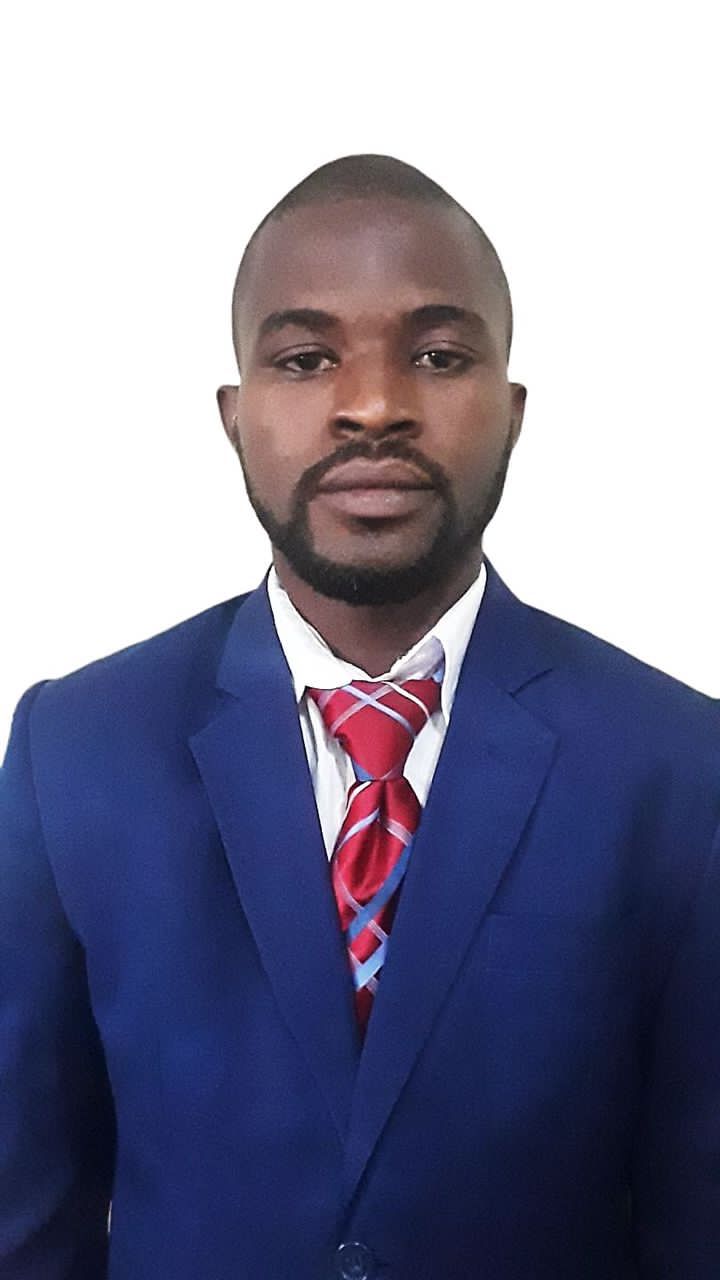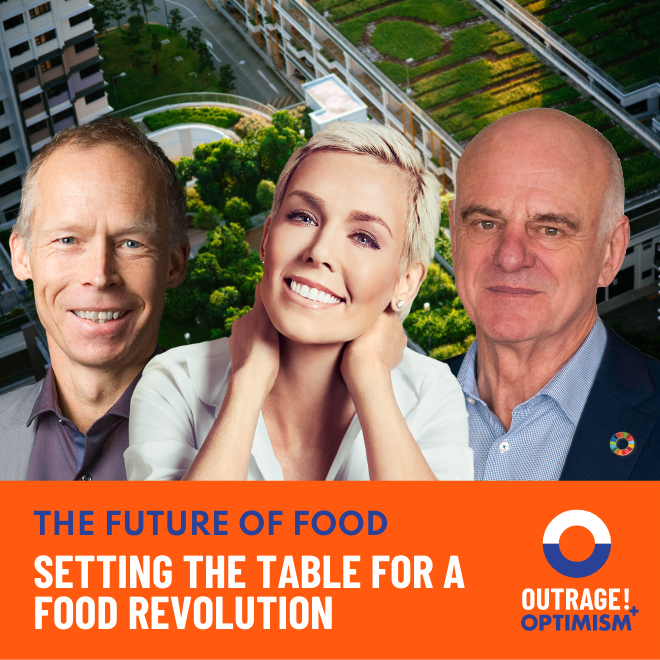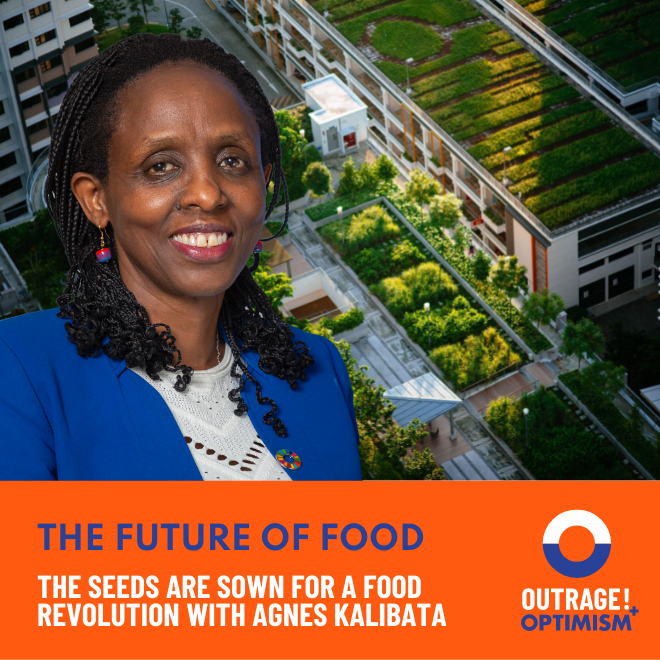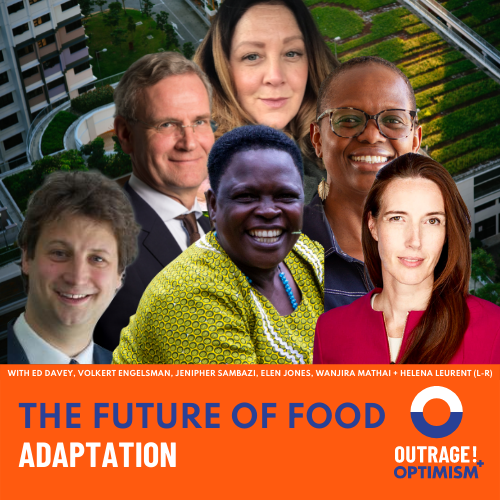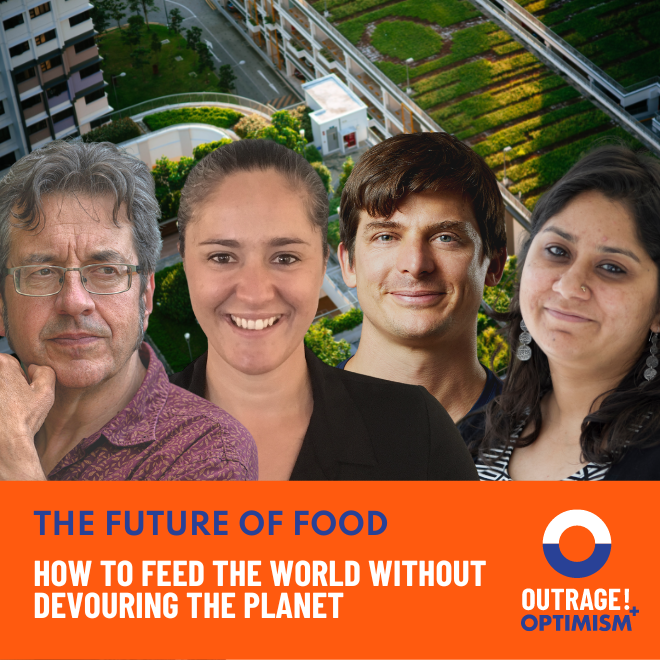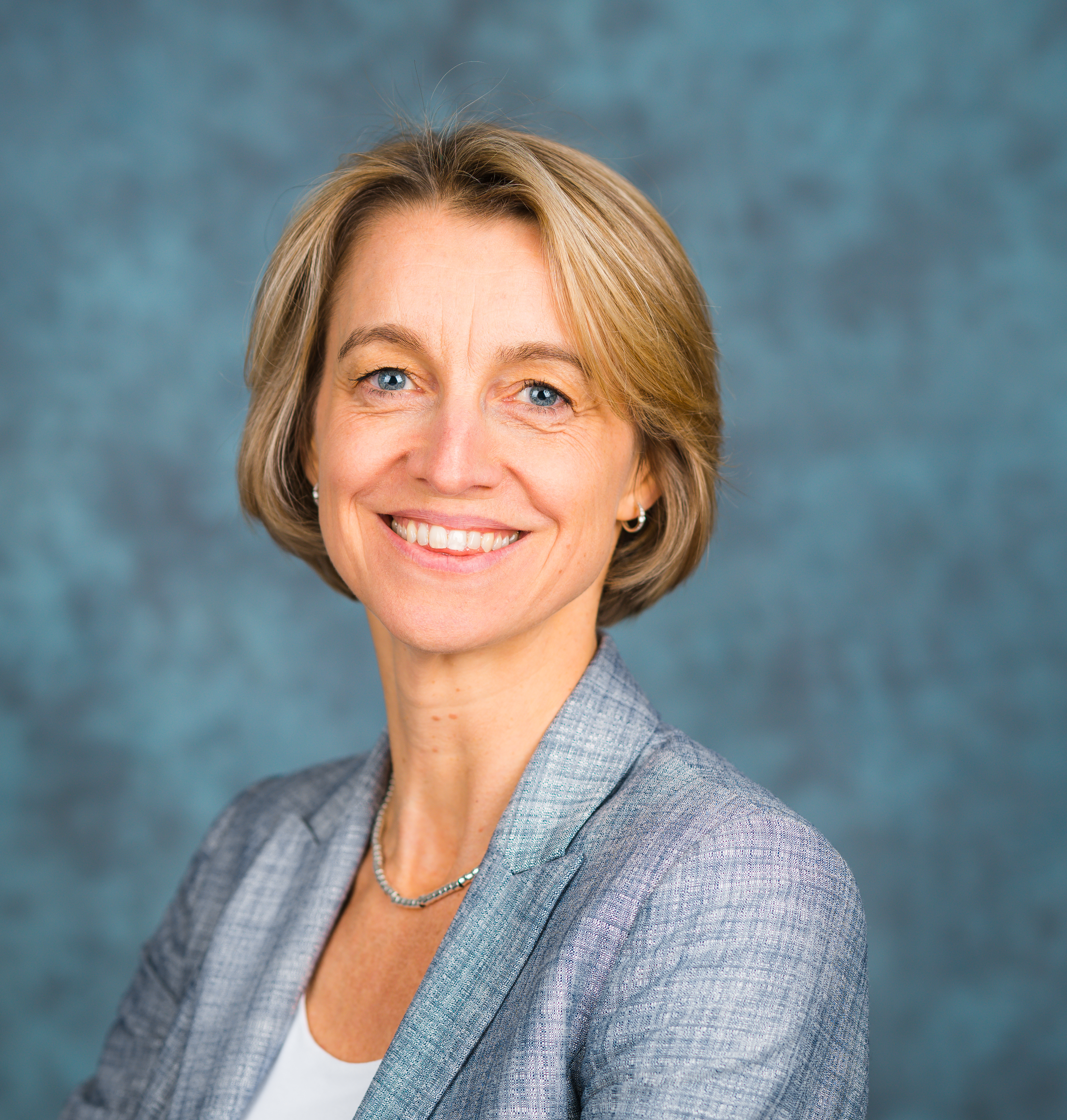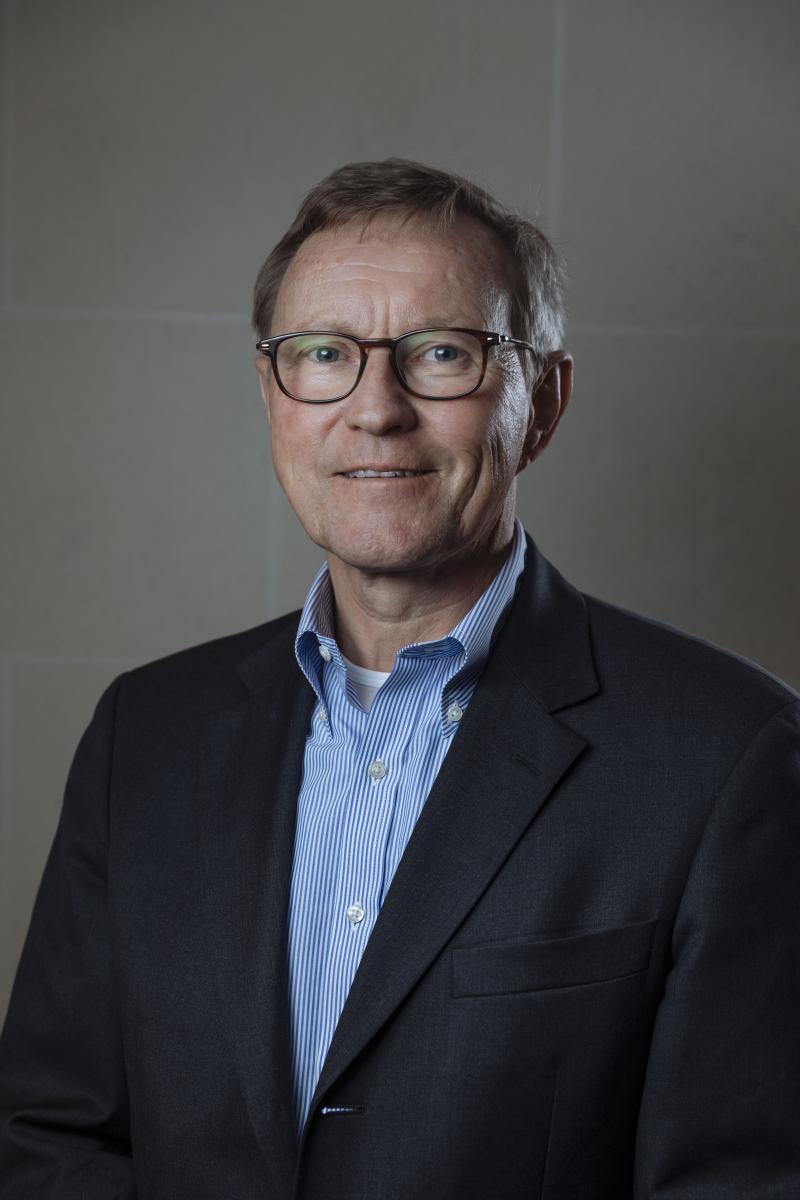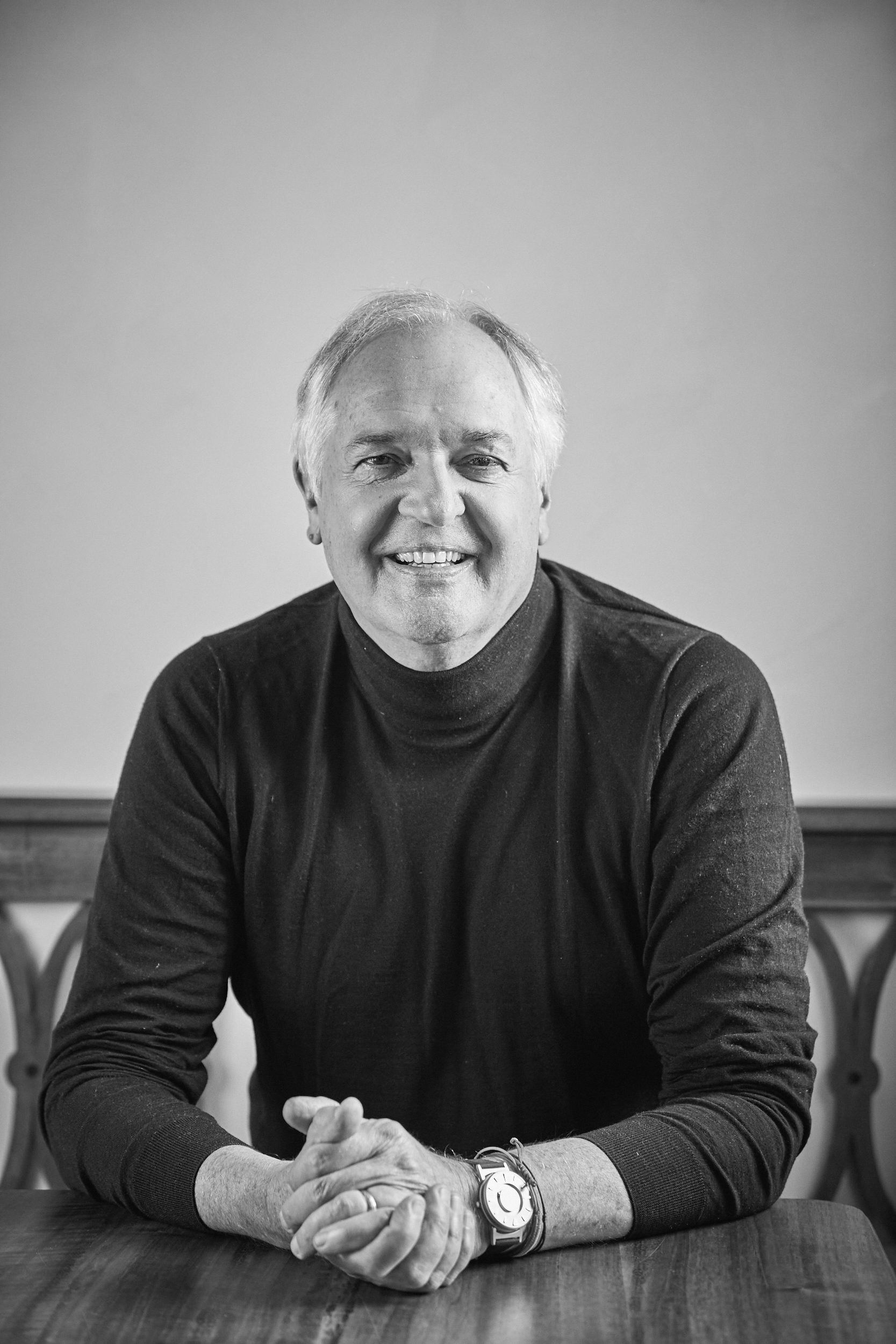177: The Future of Food: Live from COP27
About this episode
Welcome to another episode of Outrage + Optimism, where we examine issues at the forefront of the climate crisis, interview change-makers, and transform our anger into productive dialogue on building a sustainable future.
In this special episode we bring you the conclusion of our celebrated Future of Food series, recorded live from COP 27. Outrage + Optimism host Tom Rivett-Carnac pulls together an incredible line up of leaders to explore how food might act as the connecting force that engages communities and individuals and brings us all together in a united global movement.
First, Tom takes the opportunity to catch up Per Heggenes, the CEO of The IKEA Foundation, to hear why food is of huge importance to his organisation's work and why Per believes food needs to stay top of the global agenda.
Next, Tom convenes a fascinating and diverse group of guests in a unique and quirky setting: a blue shipping container repurposed in collaboration with Museum for the United Nations UN Live team and The IKEA Foundation using Global We portals, to bring the voices of people on the frontline of climate change, directly into the heart of climate conversations at COP27 via full length screens, set up in diverse global locations.
Listen to the fascinating contributions from Tom's IRL guests Paul Polman, Business Leader, Former CEO of Unilever and co-author of Net Positive; Liesbet Steer, Executive Director of the Education Commission; and Sophia Kianni climate activist, Executive Director of Climate Cardinals and the youngest member on the United Nations Secretary-General's Youth Advisory Group on Climate Change; and our Global We portal leaders from Kigali Sarah Kenkuyu, Program Manager at GiveDirectly Rwanda; Kristian Gasaro, activist, Greenpreneur and photographer; and Tanignigui Siriki Soro, a writer and community leader from the Ivory Coast.
The resulting conversation is as diverse and as fascinating as our guests themselves.
Enjoy the show!
NOTES AND RESOURCES
To learn more about our planet’s climate emergency and how you can transform outrage into optimistic action subscribe to the podcast here.
The IKEA Foundation
Website | Twitter | LinkedIn | Facebook | Instagram | YouTube
Museum for the United Nations
Website | Facebook | Twitter | Instagram | LinkedIn
GUESTS:
Per Heggenes
Twitter |
Paul Polman
LinkedIn | Website | Twitter |
Liesbet Steer
The Education Commission
Sophia Kianni
LinkedIn | Twitter | Instagram | Facebook
Sarah Kenkuyu
GiveDirectly
LinkedIn | Twitter | Facebook | Instagram
Kristian Gasaro
Tanignigui Siriki Soro
Want to participate in the COP27 Civic Imagination Lab? REGISTER HERE
Also, explore more about COP27.
It’s official, we’re a TED Audio Collective Podcast - Proof!
Check out more podcasts from The TED Audio Collective
Go listen to Abigael Kima’s coverage of COP27 on the Hali Hewa Podcast
Click through to listen to more of our episodes on The Future of Food
Full Transcript
Transcript generated by AI. While we aim for accuracy, errors may still occur. Please refer to the episode’s audio for the definitive version
Tom: [00:00:12] Hello and welcome to Outrage + Optimism. It's Tom here, still currently in Sharm el-Sheikh and excited to bring you a special live recording straight from COP27. As many of you will know, Outrage + Optimism. Future of Food series has been running over the last year in partnership with the IKEA Foundation, and this episode will mark the last episode in what has been a fascinating and very popular series. Food has been a huge talking point at this year's COP in Egypt, and on this episode we worked in partnership with the IKEA Foundation and the UN live team to gather a group of leaders. Half of whom were attending in Kigali, Rwanda, and half were in the room with me to exchange ideas about how food can play an inclusive role in bringing a wider community of people into the climate change movement. So I'll introduce this unique setting during the recording, and I hope you'll enjoy the diverse range of experiences on offer as we discuss these barriers and future opportunities. But I would just say that even in today's world of Zoom calls and everyone being on the screen, this was amazing. It really felt like we were sharing the room with these leaders in Rwanda and the connection that is possible just with that next step on technology was really amazing. Now, before we get into that conversation, I also took the opportunity to catch up with Per Heggenes, CEO of the IKEA Foundation, to ask about his organisation's approach to tackling the food system crisis and why it is a big priority for the IKEA Foundation. So thank you very much for joining us again. Delightful to see you over the course of the last year, supported by you. We've been doing this Future of Food series that has honestly been one of the best things that we've done on Outrage + Optimism. People have loved it based on the feedback, and this is the final episode in that series. So I'd love to just find out from your perspective, why is highlighting the issue of food been so integral to the mission of the IKEA Foundation?
Per Heggenes: [00:02:34] Well, IKEA Foundation focuses on improving the lives of people living in in poverty in the Global South. And one of the characteristics of this a lot of these people is the lack of food, the lack of access to food. And we know at the same time that 30 to 40% of food is wasted in the world. We know that the world can produce enough food for for everyone, but it's not happening in the right way because of all the food waste. Now, that's one thing. The second thing is actually emphasized by the pandemic. We saw that the global food chain or the global supply chain of food really got disturbed in a way that we haven't seen before. And that sort of puts the emphasis on the fact that we are dependent on the global food production chain instead of locally independent and the need for maybe looking at how can we take more of that global food production back to local food production and and do that in a way that's sustainable and more efficient and gives more people control over their own food supply?
Tom: [00:03:38] An interesting one of the things we've been facing is we've been in silence and we've made progress on that. We've now got climate and nature properly integrated as issues. And to a degree, and I'd be curious about your perspective. Food is also now being understood in terms of this intersection. The first time here at COP, we have a food pavilion. Do you think we're making progress on bringing those issues together and finding the systemic solutions?
Per Heggenes: [00:04:05] I think we're making progress because we understand the importance of food and the importance of lack of access to food across the world, and not only in the in the developing world where we normally have that problem. I think putting it on the agenda after what we experienced through the supply chain crisis of the pandemic. And then furthermore, the the war in Ukraine, which put this problem even further up on the agenda, we see that food, food, a circle of food system has to be looked at in a different way in the future, and we need to make sure that food security gets higher up on the agenda. And I think that's that's why you see it here. And there's also quite, quite a lot of focus on interest in food production in a more sustainable way and any more in a way that you produce food in a regenerative way so that the soil is taken well care of, the soil is nurtured, soil needs to be nurtured like like like a human being, and it's being nurtured and human body needs to be nurtured. You have to look at how you regenerate the soil, how you ensure that nutrients going back into the soil nutrients can be produced in the soil and get into into the food that you actually buy and consume. And if we don't think about that in a regenerative way, we're not going to have enough food, we're not going to have healthy food and nutritious food. So we can provide food security in a way that we don't do today because we're so dependent on the the the transport and the global supply chain.
Tom: [00:05:35] So last question. You as a foundation have an enormous amount of interest in the food space. Can you tell us what you're doing? Your strategy is foundation and your activities in the food space.
Per Heggenes: [00:05:46] Yeah, that will go well. Then I like to go back to the global food chain versus localised food production, because what we see is that the people in the Global South, the farmers in the global South are of course the ones who are suffering the most from climate change and have the least to do with with who created the climate change. But they are suffering badly because of droughts, lack of water. And what we're trying to do is help smallholder farmers actually deal with the necessary adaptation to a new world where climate change is going to have a huge impact on their ability to produce food. So we really work with smallholder farmers to not only improve the quality of their harvest and improve the quality of their yield, but also find a way to turn that into money so they can lift themselves out of poverty and invest in their children's health and education, which is the ultimate goal for us as a foundation.
Tom: [00:06:51] So it's great to hear how Per and his team at the IKEA Foundation have such huge ambition and commitment to tackling the much needed transformation of the food system. So now let's turn to the conversation recorded over a shared breakfast. Different ends of the same continent of Africa on Thursday morning. I hope you'll enjoy the show. And three of us will be back on Thursday. Thanks so much. Hello and welcome to Outrage + Optimism. My name is Tom Rivett-Carnac.
Liesbet Steer: [00:07:21] Liesbet Steer.
Sarah Kenkuyu: [00:07:23] Sarah Kenkuyu.
Kristian Gasaro: [00:07:23] Kristian Gasaro.
Tanignigui Siriki Soro: [00:07:26] Tanignigui Siriki Soro.
Paul Polman: [00:07:28] Paul Polman.
Sophia Kianni: [00:07:29] Sophia Kianni.
Tom: [00:07:30] And today, we're bringing you a special conversation on the future of food from Kigali and COP27. Thanks for joining us. So we're going to kick off in a moment with the most remarkable conversation between two different locations. It's the first time we've ever done this on Outrage + Optimism between some leaders here at COP27 and leaders in Kigali, Africa, who are working on the ground. And before we start the conversation, I'm just going to describe where we're sitting, because this probably wasn't apparent to listeners, but we are sitting around a virtual table, four of us sitting here in Egypt and three of us sitting in Kigali. In the most remarkable, I can only sort of describe it as a repurposed shipping container because that's precisely what it is. And through a collaboration between UN Life and the IKEA Foundation, these structures have been set up in different parts of the world to facilitate deeper collaboration between people working on these issues. As we all know, it can be very easy to end up in silos and not have the conversations that we need to have to address key issues. And this project has been remarkable at this call in facilitating conversations, bringing other people into this debate. So that's the background I really encourage you to check out is called Global We. But now we're going to turn to the conversation. So this COP has been remarkable for all sorts of reasons. It's the first real COP of implementation, The first time the world is meeting after the rulebook from the Paris Agreement was finally determined last year in Paris. And there's lots of things we can say about what's different this year.
Tom: [00:09:01] But one of the things that I've noticed is the presence of food as an issue at this cop. It's the first time there's a food pavilion. There has been programming looking at the issue of food. And as I was looking at that, I really felt like it's about time. One piece of data that I came across the other day is that 80% of people in Western Europe and North America feel like the climate movement is not welcoming to people like them. That is an astonishing failure on the part of all of us who have worked on the climate movement, because it feels to most people like it is an alien issue and something that they can't get engaged in that goes beyond the science and is to do with the culture of the climate movement and how we all work together. And we have to address it because if we're going to build the political momentum and the global momentum, we need broad participation and a sense of engagement in this issue. Now, how do we bring that back? There is obviously a thoughtful response is required from us, and it struck me that the intersection with food is probably one of the best ways we can do it. It's so fundamental to all of us. So, Paul, I'd like to start with you, legendary former CEO of Unilever, global leader on business, author of Net Positive. You've been a deep thinker about this issue for such a long time. What would you say about the issue I just set up and how we address that gap?
Paul Polman: [00:10:21] I'm glad you're doing this, Tom, and bringing food to the foreground, because at the end of the day, what we're trying to solve is an issue of humanity for actually the current population on this wonderful planet, but also for the future generations. And climate change is really one of the signals that we need to address. One of the the shortcomings of failures of our system. But if you look at our food system, it goes right to the heart of humanity that makes it so appealing. It deals with mitigation, it deals with adaptation, it deals with loss and damage. And frankly, we cannot get to the one and one half degrees warming that we can afford as a maximum. If you want to if we don't attack the food system and people are starving to finally understand that, frankly, we've been victims of our own arrogance or ignorance, if I may say, by focusing just on an energy transition, the our food system is incredibly broken and it's probably the reason of 30% more or less of our climate change, methane, deforestation being the key drivers of that. Now, what is interesting is and exciting to me is it is 30% of the solution as well.
Paul Polman: [00:11:26] And in terms of moving to regenerative agriculture, getting net positive targets for nature, protecting our restoring our biodiversity, all the things that you're very well familiar with and what is for the private sector, which undoubtedly has to be a key part. Or I would even say engine of that transformation to some extent, is that the investments you need to make have the highest return of anything I look at. And secondly, the results that you get from doing it is very quick. The moment we all decide to change our dietary habits and take one or two days a week that we don't eat meat, you have a 20% contribution to solving your climate change. So it's a very exciting area that when I help develop the Sustainable Development Goals, which we launched in 2015, leave no one behind, irreversibly eradicate poverty. You see that in all these 17 goals, our food system goes through it like like you wouldn't believe. So it puts people back on the agenda. It's square in the middle of climate change, and it's creating this sustainable, resilient future that we all aspire to.
Tom: [00:12:34] Amazing. Thank you. I completely agree with that vision. Let's let's turn to our friends in Kigali. Kristian, you're an agricultural engineer, graduate, working with local communities there in Rwanda. Can you tell us a bit about your work and how food has played a role in your work in engaging people in climate issues?
Kristian Gasaro: [00:12:53] [00:12:53]Okay. Thank you so much, Thomas. I'd say to have a food is our basic need is human life. According to the way we are accessing food, it might harm us and harm the planet. The challenge now we know what we know. I know I can have, America can have meat, but I won't know the exact impact of that food is going to affect on my future generation, on my kids. So currently I'm working on the project. It's a project that is aiming to engage more people, but engaging more people, they have to to know their impact. That is why we are educating people about their impact not only on food but friends and protect our food as the primary contributors. We are encouraging people to buy local to grow their own food. Like if you have a space of two two metres square, you be able to grow your own garden. If you choose to grow your own garden, you are able to save the money you have you've been sending to to the market. You were able to cut your emissions. What you are going to buy, the food you will be able to to save the energy. You go to the to the market. You buy the bark you keep in a fridge to keep it as fresh. You able to have your own garden, having a fresh food all ready to go. That is the project that we are working where we just showed the community. They are impacted fast by showing if we you are contributing this negatively, you can't you have the choice to make this in positive ways.
Tom: [00:15:02] I love that. And it's so fascinating to hear what you're talking about. And the intersection of food, climate action and education as three different pillars that are all mutually supportive to bring more people into it. Liesbet, I'd love to bring you into this conversation. This intersects and I love the way we're able in this to talk about grassroots and global policy and how those things interact and support each other. You lead the Global Commission on Education together with former Prime Minister Gordon Brown. Can you comment here about this issue from an education perspective, the role of food in connecting us back to some of our issues and how education is so fundamental to the whole of that issue?
Liesbet Steer: [00:15:38] Yes, thank you, Tom, and it's such a pleasure to be here. I think education is fundamental. And when we talk about the issues, we talk about that this COP education is actually often missed. And I'm very glad to hear the comments earlier about the education aspect. The reason for this is that the climate movement has tended to focus on the sort of technological solutions. But when we look at, for example, nature, positive future, when we look at nature based solutions, that's all about alternative pathways, creating alternative pathways. And how do you create these alternative pathways if you don't have educated people? So the first piece is we need education to redirect production and and the economic system to towards new pathways, and we need the skills to be able to do that. The second piece is, of course, we're already losing the battle. And when we look at the sort of impact of climate change and the adaptation that needs to happen again, adaptation, we tend to think about building seawalls or our seeds for agricultural production. But the best way to adapt is actually to educate. People who are educated are more resilient. There is evidence on that that more educated populations tend to be more resilient. So that's another reason why education should be more central.
Liesbet Steer: [00:17:25] There's actually also a direct way where food interconnects with education, and that is through school meals. School meals are some of the largest social safety nets in the world, and we know that half of the people who are food insecure today are children and young people. So we have a big population that we actually could reach through food, through school meal systems. And what that allows us to do is change habits and diets. We can use local production and basically use this school meal, the massive procurement that goes with this tie back into agricultural systems and also change agricultural production by doing so. So that's a very direct link. Education has not been central and it must be the next COP. 28 is going to make education really central and I hope in addition to having a food pavilion, we will have an education pavilion because at the moment this is the one issue that is not addressed. And we have 70% of the world's population who do not have the basic skills at the moment to participate in this new green world that we all have been talking about, and that is 900 million young people who are going to be not part of the solution.
Tom: [00:18:59] No, it's fascinating. I mean, for all the elevation of the issue of resilience, I do think this intersection with education as a tool for resilience has not completely but largely been missed by those who are beginning to talk about that. So that's really great to fill that in. Sarah, can we can we come to you back in back in Rwanda, you're the manager for an international NGO that helps deliver unconditional cash transfer programs to people living in poverty. There's a lot of different issues swirling around here in the conversation between food and climate and resilience and education. You obviously also work closely on poverty. How do you see your work on poverty and on supporting vulnerable people and lifting them out? What are the tools there that food can provide, obviously, as a a fundamental human need, but also to connect them to resilience. And to that community and to the issues we're facing globally? Load More
Sarah Kenkuyu: [00:19:52] Yes. Thank you, Thomas. So I work with GiveDirectly. How can we ask a person that has been hungry to be part of the global conversations on climate change? How can we ask a person that does not just think about strategically to think about their future when they do not have a present because of they cannot access food. So poverty? Is that the root cause of why there are so many worsening food systems today? So when we're working at the front lines with people living in poverty, most of most of them are subsistence farmers and they depend on rain fed agriculture. And so these these this range fed agriculture makes them liable to shocks climate shocks. So you have so many people that are so many post-harvest handling losses and so people do not have food. So what Give Directly has done through giving cash, unconditional cash has accorded them has accorded poor people the ability to choose to spend their money on food. And then afterwards, if they have remainders, they invest in better agricultural methods. We have 94% of our recipients spending all their money when acquiring food. Unless we give people the avenue to access food for them to have better sustainable livelihoods, they can never engage in this climate change issues.
Tom: [00:21:20] Thank you. That's amazing. That statistic about how much the people you work with spend on food and how connected it is to their income. Siriki, can I just invite you to also just come in on this issue? Because I mean, I do know about your work a bit and what you've been doing in Rwanda. So can I just invite you to comment on this broad intersection of issues that we're now working on?
Tanignigui Siriki Soro: [00:21:42] All right. Thank you so much. I'm Siriki Soro from Ivory Coast. I'm a graduate from the African Leadership University in International Business and Trade. So talking about food, the food system, I always bring it to economic perspective in terms of inflation. It's all about inflation. The food insecurity we have today is related to inflation in different countries. And what we are actually doing, we are I have a platform called the GSP in International and we give permission to people to invest in agriculture and we are supported by the Minister of Agriculture in Rwanda. And then because back in days in the African context, we believe that like with food insecurity, I mean the food system is always for the rural community. And what we are trying to do, we are trying to change that narrative to tell people like we are, we have to invest in the food system. For us to have a more resilient, different countries in terms of economic capacity.
Tom: [00:22:48] Fantastic. Thank you. That's amazing work. And thank you for joining us today. I'm going to come back to a couple of questions, everyone, in a minute. But, Sophia, I'd love to to bring you in. You are a United Nations climate advisor, in fact, the youngest ever United Nations climate advisor, if I'm correct. You also founded Climate Cardinals, a nonprofit that aims to make climate resources more accessible to people that can't speak English. You have also been one of the absolute stars of this COP speaking at some of the plenaries and making a huge impact. So thank you for joining us on the podcast. You're coming in here being able to weave different strands together. You clearly are here because you're passionate about the issue. You're a climate activist. You have a sense of the injustice that is climate change and the fact that it's been created by one group and largely experienced by another. How do you see food as an issue to bring people back to the moment we're in and enable a wider group of people to get engaged in this issue as we know they need to be?
Sophia Kianni: [00:23:43] I think it's very much like you said, for me coming to this COP. It was a lot about a balance of my two identities as an Iranian American, recognizing that the US is disproportionately responsible for climate change. But then it's countries like Iran that are responsible for only 1% of global greenhouse gas emissions that are actually on the front lines. And that directly connects to food, and particularly looking at it as a human rights issue where the Middle East is already one of the most vulnerable regions in the world because of conflicts here. Obviously, in Iran right now, young women are leading a human rights revolution and then they have to deal with living in a climate change hot spot, which leaves them vulnerable to droughts and coastal erosion and heat waves. And then when we're looking at the impacts of climate change, specifically in Egypt, rising soil salinity is eating away at crucial farmland, which is obviously very relevant to food systems. And then combining that with heat waves, it threatens children's access to food and water and it puts them at risk of malnutrition. And then heatwaves are also exacerbating drought, which is a key problem in the Middle East already, particularly in Iran. And so it causes crop failure, food insecurity, and that has severe impacts on child nutrition, particularly in communities that depend on agriculture.
Sophia Kianni: [00:24:51] And then higher temperatures are also increasing the demand for water when there's so much water mismanagement in the Middle East right now. And so the resulting water scarcity is hindering children's ability to regulate their body temperatures and stay hydrated. And it can also force communities to rely on unsafe water sources. And it leads to outbreaks of waterborne diseases like cholera. And that was what UNICEF was reporting, I think, just a few days ago in their report about the impacts of heatwaves on children. And to your point about education, I do think so much of this is deeply ingrained in the issue of like when I when I think about the United States, I grew up and I was told that meat and dairy were part of a balanced diet. And that was despite the fact that my dad was completely vegetarian. And I remember I went back to him after my maybe like third or fourth grade class about food systems. And I was like, Hey, like, my teacher told me that as part of a balanced diet, I need to eat meat every single day. And then he laughed and he was like, Well, you're going to find out soon that your education system is bought and paid for by the meat and dairy industry. And it has.
Tom: [00:25:58] You know how old at this point?
Sophia Kianni: [00:26:00] I was probably like ten years old.
Tom: [00:26:02] Nice kid for him.
Sophia Kianni: [00:26:02] Yeah. And he was like, and it has nothing to do with the impacts on your health or the impacts on climate change. It has to do with lobbying. And so from a very young age, I feel like I recognize a the importance of education, but also the importance of education outside of the school system where I was getting this information from my dad when my school teacher was feeding me something that was ultimately not synonymous with the state of the global climate crisis. And so I do think that there is a real legitimate need of reassessing our school system and also of the food groups that are fed to us, because it's like the school lunches that we were given very much followed the same ideology of like these are the balanced food groups that you need. And we ultimately know that meat and dairy is responsible for so much of agricultural emissions. And so part of it is about an education shift of making people understand that shifting to a plant based diet is not only good for you health wise, but it's also crucial for the long term sustainability of our planet.
Tom: [00:27:04] Yeah, that's fantastic. Thank you. So I know that we don't have an enormous amount of time, sadly, with all of you, but there is a question that I would love to ask all of you to answer, and if you've heard the podcast, you'll know what it is. The podcast is called Outrage + Optimism because we believe both of those are necessary for moving us forward. We need the optimism to believe that we can dig in and make this possible. But also it is an outrage that we have come so far and precipitated such injustices on this road. So if possible, I would love to ask you something you feel outraged by and something you feel optimistic about that you have heard in this shipping container that we've been sitting in for the last 40 minutes. But otherwise, just something that you feel outraged by and something you feel optimistic about based on the intersection of food and climate and how we can bring those issues together to bring more people into this. So would you like to start this.?
Tom: [00:27:57] And then we can go round the virtual table?
Liesbet Steer: [00:28:01] I'll give the other that.
Paul Polman: [00:28:02] I'm not sitting.
Tom: [00:28:03] Down. Yeah, yeah. It's a public service. I.
Liesbet Steer: [00:28:06] I do actually feel outraged by what I just heard and because education systems are both the solution and need to be part of the solution. But it's an outrage that they that the systems themselves are at the moment not fit for purpose. So while we need this transformation in in the agriculture and the food systems and nature and climate, we actually also need a transformation in education. I feel optimistic that if we can. Do that if we can transform our education systems. And that means lifelong learning. It's not just actually focusing on the young, but focusing on the entire population and using education as a positive lever for change. I think we could get somewhere. And it's it's really important in in that we teach both the substance, making sure that people understand the food groups, the right food groups and the impact, people's impact on the environment and the impact of the environment on them, but also that we teach them agency and something that education systems have not delivered and that needs to change. Is that one of the key skills that we now need to cope with this world is agency, ability to communicate, ability to be flexible.
Liesbet Steer: [00:29:44] The information is actually available because there's now a lot of information on the on the Internet. People can access information. But what we need are these great skills that allow us to think critically, engage with information and act upon it. And that is actually something that school systems and wider education systems need to deliver, and we need to do it in a flexible way. I totally agree. I just want to final, final point of this, that climate literacy, which tends to be the thing that people focus on right now in terms of engaging with school systems is very important. But at the same time, we also need to see the education system as the system that will deliver the human capital that is required for the transformation. We will not have adaptation without education. We will not have mitigation without education, because if people are uneducated, they will not be able to engage with smart agriculture. They will not be able to engage with the massive change that is needed.
Tom: [00:30:53] So it's the ultimate preparation for a changing world. Yes. Yeah. Yeah. Thank you. Wonderful. Sarah, are you happy to come in and provide us what you're outraged by and what you're optimistic about?
Sarah Kenkuyu: [00:31:06] I'm more outraged by the fact that despite of the fact that we're all in different continents, we're still struggling with the same issue on food, on food systems, whether it's the education system in the states, like Sophia just mentioned, about the different nutrition or the dietary needs. And we're also facing the same issues here in Rwanda. And if we haven't yet found a model that works in any part of our country, that is that for me makes me extremely outraged. I'm very optimistic that we're having these conversations. We are having voices for people from different communities, sharing and opening up spaces for our voices as we send more people in, in rather vulnerable populations that they can be heard and included here. So that's what I'm very optimistic about. And I hope we can come to a solution one size fits all to solve the food, the food, the food systems, the food system, issues in the world, but rather at least a model that can be replicated in different countries. But over to you.
Tom: [00:32:13] Kristian. Over to you.
Kristian Gasaro: [00:32:15] Thank you so much. Today, many people, like you said, 8% of people, they don't even care about the climate change. Yes. To be realistic, we don't care about climate change. We don't need to hear about climate change. But I care when I go to the market. Fine. For example, if this box of Tumeric cost 500 Rwandan francs, when I go to market, I find it's a 1000 of Rwandan francs. It's doubled, and I start to care about it. When you cry it is because of drought, is because of flooding, you start to care about what you consume, the effect. But no money because of the knowledge. Lack of the knowledge we don't care about climate change. Education is crucial, but is not enough. Engaging people, engaging people by providing alternative ways. To our parents, they're afraid of to change because they don't have enough knowledge. Even we don't have to keep focusing on young people. Also, we need to teach our parents they they have the mindset of having many things because it was their dreams. Having a big house, having a big many cars, so the same as on food systems. So we need to engage our people, young people. Let's stop covering education because education is boring. We can teach our people whilst they are having fun, whilst they are having some entertainment within it, educating people.
Tom: [00:34:15] I love that. Yeah. Kristian, I don't want to rush your point and I want to I want to capture all of it. So I'm going to ask you to pause your thought there, because I know that our two friends here have to leave in a minute and invite them to say what they're are optimistic about. Then we're going to finish off with you and then we're going to hear from Siriki. So, Paul.
Paul Polman: [00:34:31] Well, it's interesting. We all start with outrage. And I think that captures the energy and the passion to bloody well do something right. So that's why we like outrage first. But I'm outraged that half of the population is either undernourished or over nourished, that even today, when we know we can how to produce food, that we're wasting 30 or 40% of the food, that there are 826 million people that go to bed hungry, not even knowing that they wake up the next day. We were totally abdicating our responsibility as citizens of this planet Earth, and it ought to outrage us because it causes a lot of of issues. I'm outraged that we are at the point that the cost that we are incurring of the failures of our food system are higher than what it actually would cost us to find solutions to fix it. I'm outraged that we have here 30% of the solution of climate change, but only the audacity to spend 3% of our money on it. So we ought to be outraged. And I could go on for another hour, but I'm optimistic I won't do it.
Paul Polman: [00:35:29] Don't worry. I'm I'm optimistic because we know what to do. We have the solutions. It is actually low cost, high return for everybody. And I'm actually more optimistic because when I listen to Liesbet or Sophia or on your side, Siriki or Sarah, Kristian, this is really an issue that can be solved by the passion of people like yourselves. And we see that all over the world. So if we combine, if we learn from each other, if we form these enormous networks and hold our countries, our companies accountable, commitment's enough. We are long on words and short on actions. And this is called a commitment COP. We finally, as Tom says, have food on the agenda in the UAE and the COP 28. It will be even higher on the agenda. This is the moment now that we need to rise up to the challenge that, frankly, our fellow human beings expect of us and otherwise. I think it's not worth living because and for lots of people, it's already at that point we have that not only economic opportunity, but above all, there's moral obligation.
Tom: [00:36:34] Thank you as ever. That's wonderful, Sophia.
Sophia Kianni: [00:36:36] I think honestly, I'm outraged that young people like me have to continually come to COP's and talk about these issues and really call truth to power, because I'm a junior at Stanford right now. I should be in class. And instead it has become so crucial for me to raise my voice and to talk about these issues when, like I was saying before in school, I'm also often fed misinformation about the state of our food system. But on the same token, I think that I am very optimistic that my generation is going to really push to make sure that the climate crisis is going to be a priority. And so I think that for me, the UN Secretary-General's Youth Advisory Group, we organized a youth dialogue between the SG and 30 incredible young people from around the world yesterday. And just to hear all of them and to hear how passionate they are about this issue really reaffirmed to me that at least Gen-z is on the right path. And it's also so important for us to have intergenerational collaboration and dialogue with other leaders in this space to think about how we can work together to move forward.
Tom: [00:37:37] It's amazing. Yeah. Thank you. Thank you both. And thank you for the role you're playing here, which has been remarkable. I know you need to run. So you have said we will finish up. So thank you very much. Kristian, you were you were you had four points. And I'm really hoping that you haven't forgotten them because the first one was fantastic. So let's dive in and carry on and then we'll give the last word to Siriki. Yeah.
Kristian Gasaro: [00:37:57] The other point is to also, we had to measure our impact. Like if I'm going to cook, this means how much impact is going to affect on environment, what the actual carbon footprint is going to emit. Are we able if I know today I emit much higher because I cook the meat. Next time, I will try to reduce my footprint like cooking vegetables because I need to to eat meat because I don't have the power to stop the meat. But the next time I'll be triggered to cook another by compensating. That is why measuring the impact of our actions. It will be more crucial for individuals, for our communities, for our people, because you can improve what you can. The major measurement is very crucial. That is my hope in detaining, engaging, incentivizing and impact measurement.
Tom: [00:39:10] Amazing. Amazing. Thank you very much. I really appreciate that. Wonderful. Siriki, what do you feel at the end of this conversation? What do you feel outraged by and what are you feeling optimistic about?
Tanignigui Siriki Soro: [00:39:22] I think on all that has been said, I think it's all about the consciousness of responsibility. We live in the world of today. Today we live in a world where the consciousness of responsibility is more vivid. Yeah. Than that. We pride means we have all to live more than what we have received. And as I've been saying, the time has come now, and it is for us to act all above the dots. We have to have some concrete and bold actions to bring the world back to life.
Tom: [00:40:00] Yeah. Thank you all so much. It's been such a joy to see you this morning. I feel like we're in the room with you in Kigali, and I hope you feel a little bit like you are here at COP. Really appreciate your perspectives. Also, everybody here in the room, this has been a wonderful conversation. Look forward to this. The end of our future of food episode and Outrage + Optimism. I'm sure we'll talk about it more in the future, but thank you very much for joining us and enjoy the rest of your day.
Sophia Kianni: [00:40:23] Thank you.
Paul Polman: [00:40:23] Thank you. And you guys have to eat something.
Tom: [00:40:26] You make a mighty fruit.
Liesbet Steer: [00:40:29] Look so good. I know. Looks a lot.
Sophia Kianni: [00:40:32] Better than ours so enjoy. We'll see you guys.
Clay: [00:40:38] Hey, everyone. This is Clay. Producer of Outrage + Optimism. Thank you for listening and joining us for the final episode in our series on the Future of Food. It's been a fantastic series and we're so grateful to have been able to make it. Now. We've been getting a lot of new listeners since our announcement last week that we're now officially a TED podcast, so I have a message for all of our new listeners. First of all, welcome. It's great to have you. And second, there are more episodes in this series, The Future of Food, that are available to listen to right now wherever you get your podcasts. So check the show notes for a link to all the other episodes in the series or go to OutrageandOptimism.com. It's all there. Now, of course, this series would not be possible without the support to make it from the IKEA Foundation. So IKEA Foundation, thank you so much for partnering with us to make this series. And thank you to Per for joining us on today's episode. More thank yous. Thank you to the museum for the United Nations, UN live team and the IKEA Foundation as well for collaborating together on the Global We portal project and recording it. And it's just such a privilege to be able to share all this with our listeners. Thank you to all of this week's guests who piled into the shipping containers to join us for an engaging conversation on the future of food. And I just want to mention to everyone listening, just like every week, if you want to connect with any of the guests that you heard today, follow our organizations that we partner with, like the IKEA Foundation or read a transcript of the episode. You can check the show notes below. For all of that. We've got socials, we've got links. It's all there for you. Okay, Tom said it first, but it's worth repeating. We'll be right back here in your feed Thursday, which actually is tomorrow. So we'll see you tomorrow. All right. Bye.
Your hosts

Tom Rivett-Carnac
 Follow Tom Rivett-Carnac on Instagram
Follow Tom Rivett-Carnac on Instagram
Guests
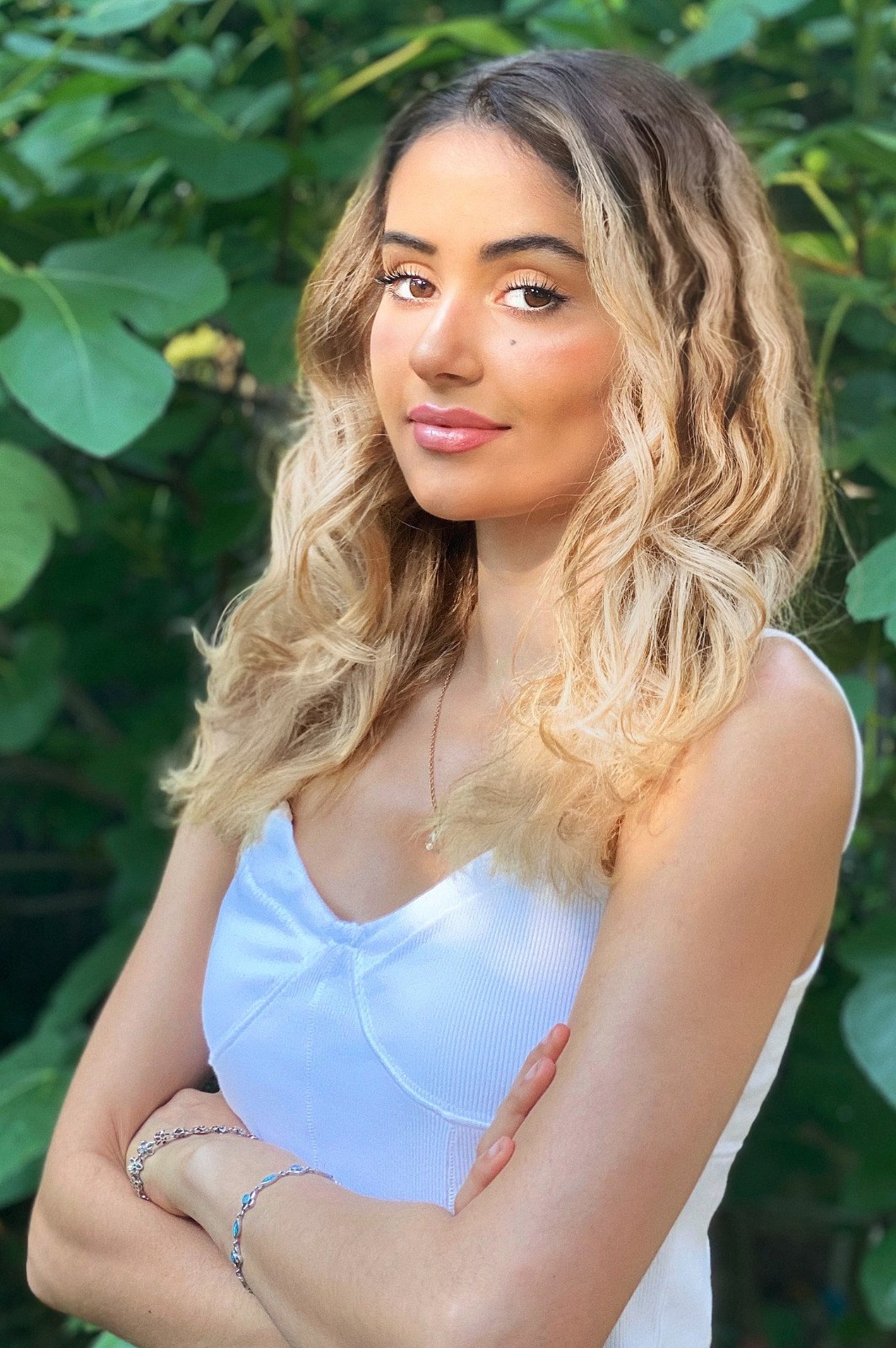
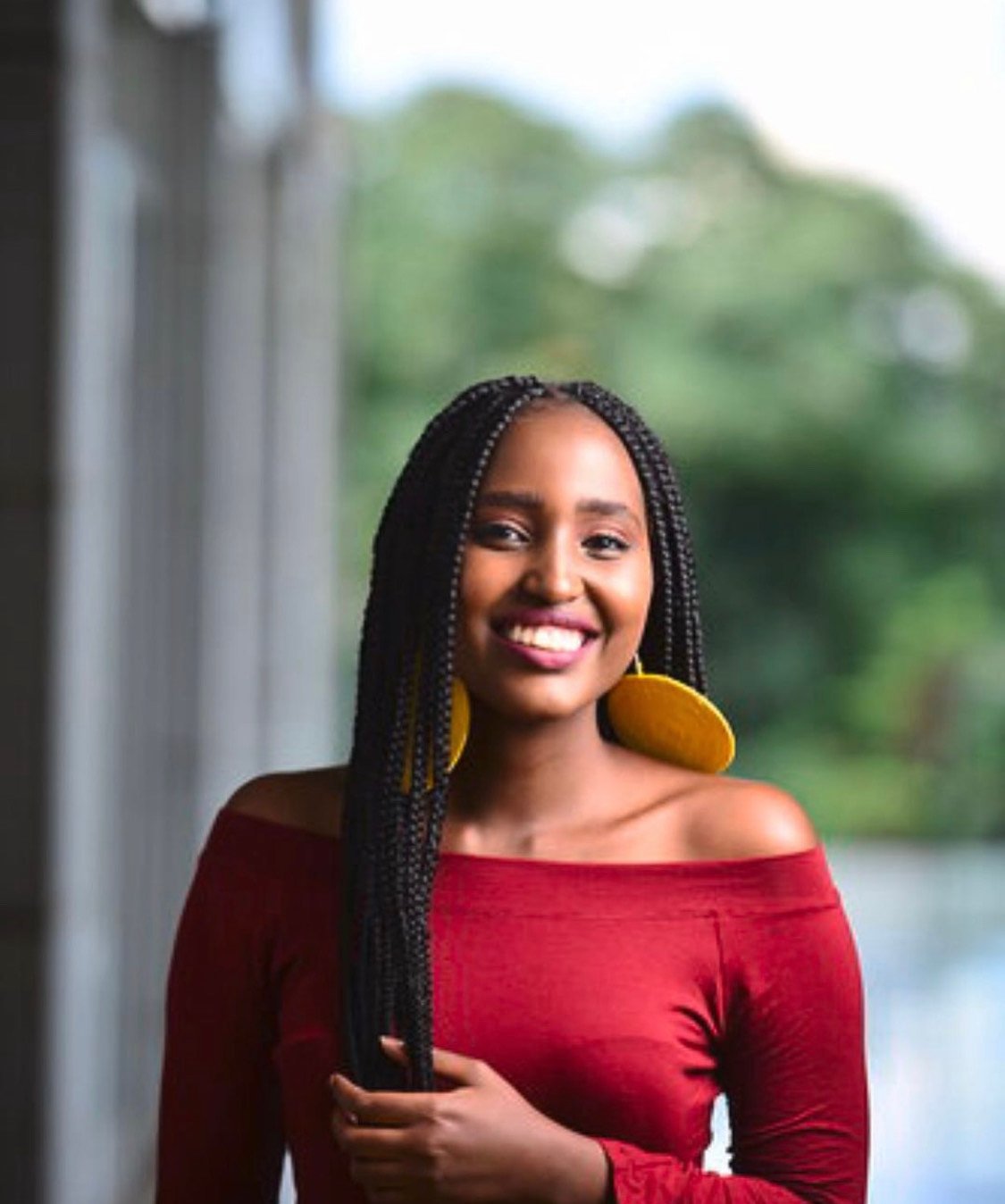
Sarah Kenkuyu
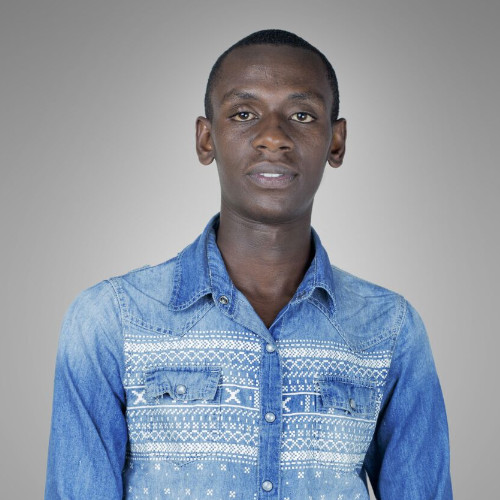
Kristian Gasaro
